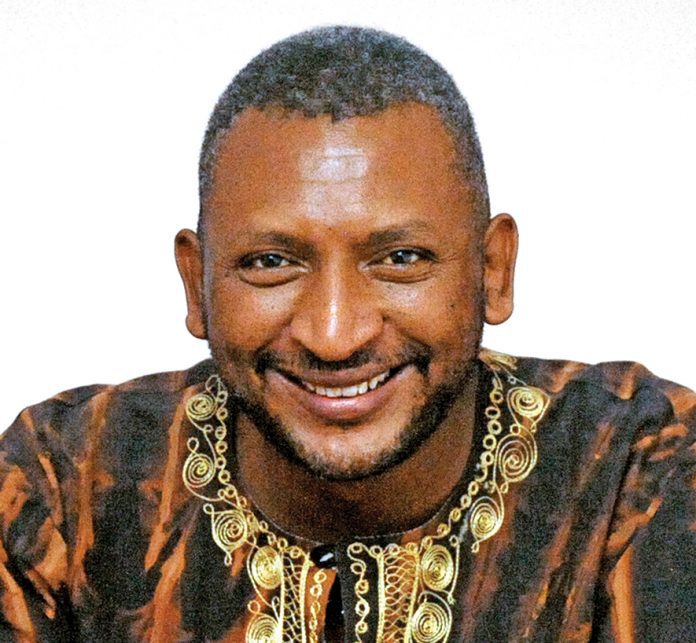As Kenya marked its 59th anniversary of internal self-rule on June 1, a controversial play by the nation’s foremost author, Ngũgĩ wa Thiong’o, was staged in sold-out shows. It had been 45 years since it was banned and the author detained. The performance offers a useful filter to illuminate how the nation has fared in recent years.
Democracy is gradually taking root but corruption is still rife. This makes Kenya’s largely youthful population restive.
Ngaahika Ndeenda (I Will Marry When I Want) is the most consequential piece of writing by Ngũgĩ wa Thiong’o and his collaborator, the late Ngũgĩ wa Mirii. The drama tells the story of Kiguunda, a peasant whose tiny strip of earth is being targeted by Ahab Kioi, a local tycoon who represents international financial interests. The play captures the tempestuous romance between Kiguunda’s daughter and Kioi’s son, which results in an unwanted pregnancy and a bleak future. Kiguunda’s delusion of a white wedding as social leverage leads to nothing but mockery and dispossession.
Within months of its staging, Ngũgĩ was detained without trial in late 1977. Under Kenya’s old constitution, which was replaced by a more progressive one in 2010, it was lawful for the president to detain anyone without trial. Though the reason for Ngũgĩ’s detention has never been given, he told me recently its timing affirmed he had been targeted for writing in his indigenous language, Gikuyu.
“I thought, wait a minute, I have been writing in English over the years and nobody ever bothered with me. I write one play in Gikuyu and I’m detained, so I’m going to write in Gikuyu.”
Ngũgĩ spent a year at the Kamiti maximum security prison. His detention helped shine a light on Kenya’s human rights record. It also shaped his life in writing and political activism. Released in 1978, Ngũgĩ was denied the right to return to his old job at the University of Nairobi. He went into exile in 1982. Though the rest of his books were not banned, they were not taught in Kenyan schools for the next two decades.
In a sense, Ngaahika Ndeenda was both a point of departure and a point of return. In 1967, Ngũgĩ recorded in Decolonising the Mind how colonial power structures were reproduce through education and the imposition of European languages and literature in Africa. He said: “After I had written A Grain of Wheat I underwent a crisis. I knew whom I was writing about but whom was I writing for … I have reached a point of crisis. I don’t know whether it is worth any longer writing in English.”
In 1977, Ngũgĩ returned to his village in Limuru, and mobilised the community to build a makeshift community theatre. This was to protest against being denied access to the Kenya National Theatre. He and Mirii scripted a play they thought reflected the realities that confronted ordinary villagers and factory workers in Limuru. The open-air theatre was razed by the government. Ngũgĩ was detained.
In detention, Ngũgĩ produced the allegorical Caitani Mutharaba-ini (Devil on the Cross), which he wrote on toilet paper in Kamiti, alongside his prison memoir Detained. It was while promoting these two texts in London in July 1982 that Ngũgĩ received a coded message telling him he’d receive “red carpet treatment” on his return. He returned to Kenya only in July 2004. Though he was mobbed by hordes of ordinary Kenyans at the airport, his return had a tinge of tragedy: he was brutally attacked and his wife raped.
The return of Ngaahika Ndeenda to Kenyan theatres marks the evolution of the nation’s artistic freedom. “Kenyatta put me in a maximum security prison. Moi drove me into exile. Uhuru [Kenyatta] received me at the State House,” Ngugi says.
While Kenyatta’s hosting of a former dissident is a powerful visual of expanding democratic space, the social ills that Ngũgĩ highlighted 45 years ago still fester.
- Kimani is professor of practice, Aga Khan University Graduate School of Media and Communications. This article first appeared on The Conversation
Follow @SundayWorldZA on Twitter and @sundayworldza on Instagram, or like our Facebook Page, Sunday World, by clicking here for the latest breaking news in South Africa. To Subscribe to Sunday World, click here



